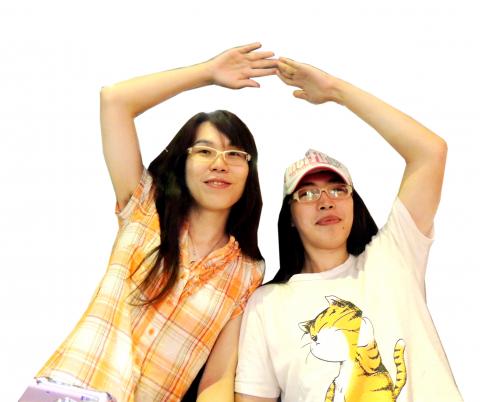When the news broke, Abbygail Wu (吳伊婷) was standing outside the Ministry of the Interior, holding photocopies of a press statement that detailed just what she thought of the officials inside.
“They decided the fate of our marriage in this closed-door meeting, without having consulted us. The government’s role should be to protect the people and act on behalf of the people. Why have they turned around and broken up a family? We don’t need this kind of government, and we think this decision is completely unfounded,” she wrote with her partner, Jiyi Wu (吳芷儀).
But in a verdict that caught the couple off guard, officials ruled to uphold their 10-month-old marriage. At 5:10pm, Victoria Hsu (許秀雯), director of the Taiwan Alliance to Promote Civil Partnership Rights (TAPCPR, 伴侶盟), who was representing their interests at the meeting, notified them via text message that officials had ruled in their favor. “I didn’t believe it until she came out and said it again,” said Abbygail Wu.

Photo: Enru Lin, Taipei Times
The decision recognizes the Wus — a transgender couple who are both registered as female — as lawfully wedded. LGBT activists and international media have lauded the decision, saying it will help push a gay marriage amendment that Democratic Progressive Party Legislator Cheng Li-chiun (鄭麗君) will introduce in September.
Hsu, who co-wrote the amendment draft, said she is very optimistic about the bill’s prospects. According to a TAPCPR survey conducted in June and July, over 50 percent of Taiwanese support gay marriage, and public support for LGBT rights are only strengthening over time, she said.
However, Hsu said that when deliberating over the Wus’ case, government officials made no concessions or new moves on gay marriage.
Last Wednesday, in her opening remarks, convener and Deputy Interior Minister Lin Tzu-ling (林慈玲) stressed that the agenda is “absolutely unrelated to the gay marriage issue, which is a matter for the Legislative Yuan,” Hsu said.
Hsu reported that during the three-hour discussion, one main argument against the marriage was that sanctioning it provides a loophole for same-sex marriage. For example, one woman in a lesbian relationship can apply for a sex change and then marry her partner, according to Hsu.
“This argument is based on the belief that many gay people would be willing to undergo an operation and live as another gender. In other words, these officials believe that homosexual orientation is the same thing as transgender identity. But for most gay people, that is not true,” she said.
Asked why the interior ministry made its about-face, Hsu responded that officials decided that they do not have a legal basis for marriage revocation. “I think the interior ministry is aware that it does not have the legal support to take away rights, and the reason is that there are no laws that govern sexual identification.
“In Argentina and the UK, there are laws. The point is not that they are liberal laws, though it is true that they are liberal. The point is that the laws exist,” she said.

That US assistance was a model for Taiwan’s spectacular development success was early recognized by policymakers and analysts. In a report to the US Congress for the fiscal year 1962, former President John F. Kennedy noted Taiwan’s “rapid economic growth,” was “producing a substantial net gain in living.” Kennedy had a stake in Taiwan’s achievements and the US’ official development assistance (ODA) in general: In September 1961, his entreaty to make the 1960s a “decade of development,” and an accompanying proposal for dedicated legislation to this end, had been formalized by congressional passage of the Foreign Assistance Act. Two

Despite the intense sunshine, we were hardly breaking a sweat as we cruised along the flat, dedicated bike lane, well protected from the heat by a canopy of trees. The electric assist on the bikes likely made a difference, too. Far removed from the bustle and noise of the Taichung traffic, we admired the serene rural scenery, making our way over rivers, alongside rice paddies and through pear orchards. Our route for the day covered two bike paths that connect in Fengyuan District (豐原) and are best done together. The Hou-Feng Bike Path (后豐鐵馬道) runs southward from Houli District (后里) while the

March 31 to April 6 On May 13, 1950, National Taiwan University Hospital otolaryngologist Su You-peng (蘇友鵬) was summoned to the director’s office. He thought someone had complained about him practicing the violin at night, but when he entered the room, he knew something was terribly wrong. He saw several burly men who appeared to be government secret agents, and three other resident doctors: internist Hsu Chiang (許強), dermatologist Hu Pao-chen (胡寶珍) and ophthalmologist Hu Hsin-lin (胡鑫麟). They were handcuffed, herded onto two jeeps and taken to the Secrecy Bureau (保密局) for questioning. Su was still in his doctor’s robes at

Mirror mirror on the wall, what’s the fairest Disney live-action remake of them all? Wait, mirror. Hold on a second. Maybe choosing from the likes of Alice in Wonderland (2010), Mulan (2020) and The Lion King (2019) isn’t such a good idea. Mirror, on second thought, what’s on Netflix? Even the most devoted fans would have to acknowledge that these have not been the most illustrious illustrations of Disney magic. At their best (Pete’s Dragon? Cinderella?) they breathe life into old classics that could use a little updating. At their worst, well, blue Will Smith. Given the rapacious rate of remakes in modern